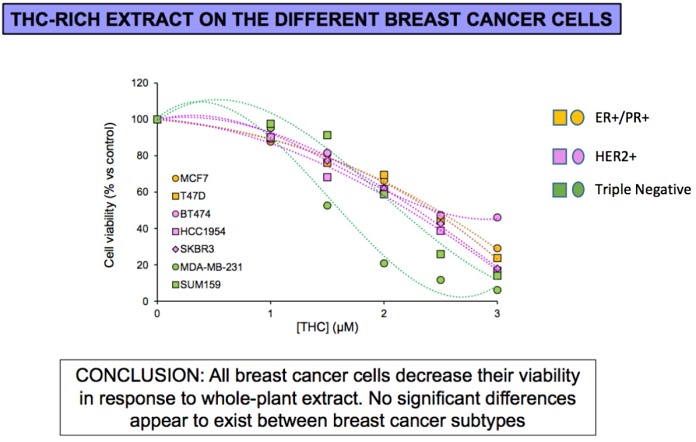Zelda Therapeutics reports positive results in breast cancer study using cannabinoids

Zelda Therapeutics (ASX: ZLD) has reported positive results from its ongoing pre-clinical research into the use of cannabinoids as anti-cancer agents.
Key Highlights:
- Follows on from initial results announced in November 2016 which showed specific formulations of THC-rich oil was significantly more potent at reducing HER2+ breast tumour growth than pure THC and equally as potent as Lapatanib in reducing tumour growth in mice hosting HER2+ human tumours.
- Latest results from a series of in vitro studies confirms statistically significant anti-cancer effect across a range of different breast cancer cell lines using both THC-rich and CBD-rich oils.
- These results demonstrate the potential for cannabinoid-based therapies to be therapeutically beneficial in a broad spectrum of breast cancer types including hormone receptor positive, HER2+ and Triple Negative cancer types.
- Conducted by world leading cannabis cancer researchers at Complutense University of Madrid, the results show THC-rich oil had significantly greater anti-cancer effect than pure synthetic THC.
- Studies are ongoing with further data expected in coming months from additional in vitro and in vivo studies currently underway.
- Ability to incorporate cannabinoids into treatment regimes provides new therapeutic opportunities.
These latest results expand and build upon the initial proof of concept results announced in November 2016.
These latest experiments expanded the number of cancer cell lines being tested to include:
- Hormone Receptor Positive (ER+/PR+) – typically treated with surgery and chemotherapy agents such as tamoxifen although resistance can build to standard drugs.
- HER2+ – typically treated with antibody drugs such as Herceptin with relatively high success rates.
- Triple Negative – aggressive form of breast cancer with limited treatment options.
These latest experiments tested THC-rich and CBD-rich extracts supplied by Zelda’s partner Aunt Zelda’s (together “Zelda”) against a number of cell lines and demonstrated that a statistically significant anti-cancer effect was produced across multiple cell lines and across all three cancer sub-types as described above.
In particular, the Zelda THC-rich formulation showed significantly greater anti-cancer effect than pure synthetic THC suggesting that full extracts have greater efficacy than pure compounds. This effect was consistent across all cancer sub-types suggesting a novel mechanism of action that could form the basis for the development for future therapies.
These results were generated by world leading cannabis cancer researchers at Complutense University of Madrid, led by Professor Cristina Sánchez and Professor Manuel Guzmán.
The in vitro study was carried out in at least two different cell lines of each of the three cancer sub-types described above and measured cancer cell viability compared to controls.

The positive results provide support to continue the study of Zelda formulations as anti-cancer therapeutics in their own right or in combination with current chemotherapy and radiotherapy regimes. A series of follow-on in vitro studies are in progress expanding the study of CBD-rich extracts alone and in combination with THC-rich extracts to determine if there is a synergistic effect.
In addition, an expanded in vivo/animal study is underway examining the anti-cancer effect of Zelda’s extracts compared to pure THC and pure CBD as well as certain chemotherapy agents against HER2+ and Triple Negative human tumours hosted in rodents (orthotopic tumours). Initial results of these studies are expected in 3Q2017.
Triple Negative breast cancers, constitute approximately 15% of breast cancers and are the most aggressive type. These cancer growths do not have any of the receptors commonly found in breast cancer cells, and as such common treatments like hormone therapy and drugs that target the necessary receptors, are ineffective. With chemotherapy, radiation and surgery being the only options, there is significant market demand for new treatments to increase survival rates.
Professors Sánchez and Guzmán are acknowledged as world leaders in studying the anti-cancer effects of cannabinoids and have published pioneering papers in prestigious scientific journals detailing specific mechanisms of action of cannabinoids on certain cell pathways. Both researchers sit on the Zelda Medical Advisory Board and provide significant guidance in terms of pre-clinical research focus.
The study forms part of a multi-year work programme, funded by Zelda, at the Complutense University focused specifically on gaining a better understanding of the efficacy of certain whole-plant extracts known to have biological activity in humans.
Breast cancer is the most common cancer and the second leading cause of cancer related deaths in Australian women. The prevalence of breast cancer in Australia alone is increasing and forecast to reach 47 diagnosis per day by 2020. On a global scale the incidence of the disease is also significant.
Zelda Therapeutics is bringing together leaders in the field to develop a natural cannabis based therapy which has the potential to provide patients with more comfort and increase survival rates.
Zelda’s focus is to generate data packs in a form typically expected by the bio-pharmaceutical industry.
The ultimate aim is to licence this intellectual property to a major group better resourced to progress into formal human clinical trials in the area of cancer therapy.
Commenting on the study results, Executive Chairman Harry Karelis stated:
“We are very excited by the continued positive data being generated by our studies. We continue to develop our knowledge in this important clinical area and believe there is growing evidence to consider cannabinoids as part of the future treatment regimes for breast cancer particularly for Triple Negative tumours that currently have limited treatment options. There is a long way to go before this approach reaches formal human clinical trials but importantly, this data supports the anecdotal experiences already seen in patients in California.”
Professor Cristina Sánchez stated:
“These new results are very exciting and provides additional evidence that strongly points in favour of using whole-plant extracts over single cannabinoid molecules. We look forward to completing our next round of studies in coming months.”
